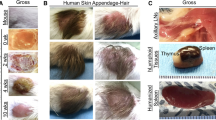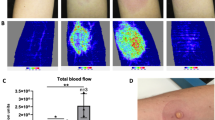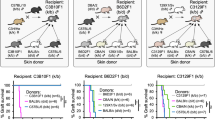Abstract
BALB/c skin grafts incubated with ribonucleic acid (RNA) from C3H mice were rejected when transplanted to syngeneic recipients1. Such grafts were rejected between 10 and 27 days after transplantation with a median survival time (MST) of 18 days. The MST of C3H skin on BALB/c recipients was 12.5 days.
This is a preview of subscription content, access via your institution
Access options
Subscribe to this journal
Receive 51 print issues and online access
$199.00 per year
only $3.90 per issue
Buy this article
- Purchase on Springer Link
- Instant access to full article PDF
Prices may be subject to local taxes which are calculated during checkout
Similar content being viewed by others
References
Guttmann, R. D., Kraus, E. D., and Dolan, M. F., Nature, 203, 196 (1964).
Billingham, R. E., and Medawar, P. B., J. Exp. Biol., 28, 385 (1951).
Author information
Authors and Affiliations
Rights and permissions
About this article
Cite this article
ASKONAS, B., BRENT, L., GOWLAND, G. et al. Failure to change the Antigenicity of Skin Grafts by Incubation with Allogeneic Ribonucleic Acid. Nature 212, 1257–1258 (1966). https://doi.org/10.1038/2121257a0
Received:
Published:
Issue Date:
DOI: https://doi.org/10.1038/2121257a0
Comments
By submitting a comment you agree to abide by our Terms and Community Guidelines. If you find something abusive or that does not comply with our terms or guidelines please flag it as inappropriate.



